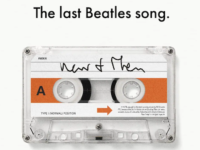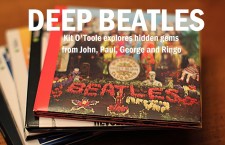Ringo Starr’s platinum-selling international Top 10 smash album Ringo arrived in November 1973 as the closest thing to a full-fledged Beatles reunion that fans would ever get. Paul McCartney, John Lennon and George Harrison appeared on the album – though, of course, not all together with Starr at the same time.
The album spun off Starr’s only solo No. 1 singles, including “Photograph” – which was co-written by Harrison. These successes served to make a larger point: The combination of Starr and material from his former Beatles bandmates has provided Starr with many (some might say most) of his career highlights. Here’s our take on the Top 5 – with five more honorable mentions.
We’ve (sometimes very reluctantly) left off songs written by Starr or others that simply featured fellow Beatles – including “You’re Sixteen,” the second No. 1 from Ringo that included McCartney. Also passed over: “King of Broken Hearts” with Harrison from 1998’s Vertical Man; 1960s-era Beatles cover songs like “Matchbox” and “Act Naturally,” which hit for Carl Perkins and Buck Owens, respectively; Ringo’s fun 1974 take on the Platters’ “Only You” with Lennon; or the terrific “Walk With You” with McCartney from Y Not in 2010. (“Yellow Submarine” also qualifies, but, c’mon. Really? We’re not going there.)
Instead, this list includes only songs that were originally composed with or by one of the other three members of the Beatles …
(WITH THE BEATLES, 1963)
Ringo Starr’s original showcase moment, in the days of shriek-soaked black-and-white Beatles concerts. Joining in on the soaring harmonies even as he fires off shot-gun fire rhythms, Starr gives this song an alluring, very open-hearted innocence. Yet history has forgotten, thanks to the delicious lasciviousness of the Rolling Stones’ version of this tune, just what an ardently conveyed rave-up moment it used to be for the Beatles. Mick Jagger turned Starr’s meek little Valentine’s Day request into a dark, almost savage entreaty, and the Stones ended up with a No. 12 hit. Figures, right? For a world only just learning the pop-psych personality profiles of the Beatles – the Quiet One, The Cute One, so on – this remains a definitive track, forever framing the idea of Starr as lovelorn also-ran.
(RUBBER SOUL, 1965)
Starr’s voice, honky then lugubrious and often so flatly straightforward, has always been a perfect fit for a country and western-inspired lyric, something that made his second solo recording – 1970’s underrated Beaucoup of Blues – such a delight. This track is one of the best early examples, with a deep undercurrent of maudlin resignation well suited for Starr, along with George Harrison doing his best Carl Perkins rockabilly-cat guitar twangs. “What Goes On” is also the very first co-writing credit for Starr, though the drummer downplayed his contributions during a 1966 press conference, saying he’d written “about five words, and I haven’t done a thing since!”
(RINGO, 1973)
This former U.S. chart-topper suffers some from the age in which it was recorded, as Ringo Starr must contend with a Phil Spector-ish storm of strings, and an army of backup singers and sidemen including another drummer, a saxophonist and three (!) guitarists. It was a sound that co-writer George Harrison favored at the time, but Spector was actually nowhere to be found. Richard Perry produced Ringo, and the orchestral arrangements are by Jack Nitzsche. “Photograph” actually served as an update of Starr’s sad-sack Mop Top character sketch into 1973’s shag-carpeted present tense. That’s understandable, really, since this was the first Beatles solo album to invoke the Beatles’ golden era with any measurable success – from its Sgt. Pepper takeoff of a cover, to the appearance of all four former Beatles on separate songs. More on that in a moment.
(SINGLE, 1971)
A No. 4 smash in both the U.S. and Starr’s native England, “It Don’t Come Easy” was originally credited to Starr alone, but bootleg demos have since surfaced that show Harrison performing a guide vocal for Starr. (Further evidence is perhaps provided during 1971’s Concert for Bangladesh, when Starr forgot the words to this song on stage.) Nevertheless, “It Don’t Come Easy” remains one of Starr’s signature moments, and one that would have been right at home on any late-era Beatles project. That’s fitting since the single was initially produced by George Martin, and also featured Harrison on electric guitar. None of this makes “It Don’t Come Easy” all that original, of course, but it’s entertaining nevertheless. Members of Badfinger originally sang “Hari Krishna” – OK, now you know it was actually George’s song – over a portion of the instrumental segment on the track.
(RINGO, 1973)
This wouldn’t have worked if its author had handled lead vocals, but in Ringo Starr’s hands, “I’m the Greatest” becomes an exuberant parody of cocksureness. This song is so ironic and perfectly timed throughout that it tops even the bigger hits on this list. Lennon plays piano and sings, while Harrison joins in with a stinging guitar part. Together, they provide this fizzy counterpoint to the Starr’s customary undercurrent of melancholy. (Does anybody think he really believed it when “my mama told me … I was great”?) This is perhaps the closest the Beatles ever got to reforming, not just in the sense of there being three of them in the room, but also in the way the song turns expectations on their ear. This doesn’t sound like the solo Beatles trying to sound like “the Beatles,” a rare thing.
HONORABLE MENTIONS: “Six O’Clock,” by McCartney (‘Ringo,’ 1973): Maybe a throwaway on a Paul record, but works perfectly here; “With A Little Help From My Friends,” by McCartney with Lennon (‘Sgt. Pepper,’ 1967): So closely associated with Starr that you just have to mention it, I suppose; “Grow Old Along With Me,” by Lennon (‘What’s My Name,’ 2019): McCartney added bass and backing vocals while former Lennon producer Jack Douglas arranged the strings with a George Harrison quote; “Private Property,” by McCartney (‘Stop and Smell the Roses,’ 1981): A return to form after an awful period, but too late to recapture much momentum. Could have been a hit single, in a different time; “Good Night,” by Lennon (‘The Beatles,’ 1968): Singing a bedtime lyric only Ringo could pull off, the White Album ends on a profoundly sweet note.
- The Bright Spots in George Harrison’s Troubled ‘Dark Horse’ Era - December 29, 2024
- The Pink Floyd Deep Cut That Perfectly Encapsulates ‘The Wall’ - November 29, 2024
- Why Pink Floyd’s ‘The Endless River’ Provided a Perfect Ending - November 11, 2024



